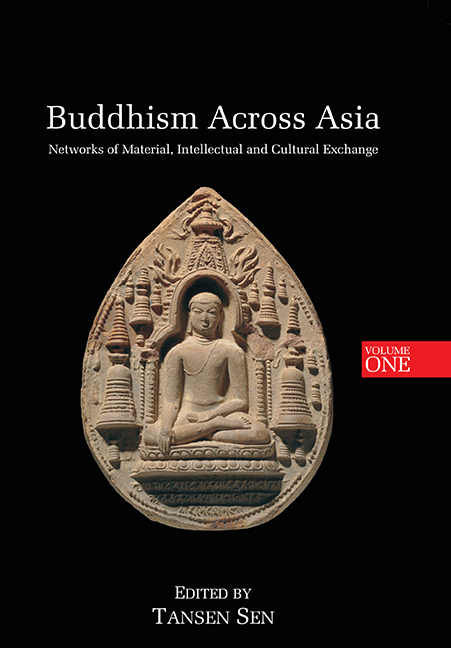Book contents
- Frontmatter
- Dedication
- Contents
- Introduction: Buddhism in Asian History
- Part I Tran smissions of Buddhism Before the Seventh Century
- Part II Buddhism Across Asia between the Seventh and Fifteenth Centuries
- Part III Buddhist Connections after the Fifteenth Century
- 17 The Sphere of the Sāsana in the Context of Colonialism
- 18 Patronage and Place: The Shwedagon in Times of Change
- 19 Wang Hongyuan and the Import of Japanese Esoteric Buddhism to China during the Republican Period
- 20 Buddhist Practices and Institutions of the Chinese Community in Kolkata, India
- List of Contributors
- Index
- Miscellaneous Endmatter
17 - The Sphere of the Sāsana in the Context of Colonialism
from Part III - Buddhist Connections after the Fifteenth Century
Published online by Cambridge University Press: 21 October 2015
- Frontmatter
- Dedication
- Contents
- Introduction: Buddhism in Asian History
- Part I Tran smissions of Buddhism Before the Seventh Century
- Part II Buddhism Across Asia between the Seventh and Fifteenth Centuries
- Part III Buddhist Connections after the Fifteenth Century
- 17 The Sphere of the Sāsana in the Context of Colonialism
- 18 Patronage and Place: The Shwedagon in Times of Change
- 19 Wang Hongyuan and the Import of Japanese Esoteric Buddhism to China during the Republican Period
- 20 Buddhist Practices and Institutions of the Chinese Community in Kolkata, India
- List of Contributors
- Index
- Miscellaneous Endmatter
Summary
Introduction
There is a long history of contact between the Buddhist communities of Lanka (now Sri Lanka) and those in the region we refer to as Southeast Asia. This rich history is characterised by complex processes of influence and exchange that bound Lanka to the wider southern Asian region in ways that we still struggle to understand. Buddhist texts, persons carrying other forms of specialised knowledge, modes of devotional-ritual practice, and aesthetic patterns travelled along intersecting land and maritime circuits through this region. At crucial points from the twelfth century onwards, monastic lineages from Lanka, often referred to as Sīhala Sangha (monks related to the land of Sīhala), were imported to polities in what is now Burma and Thailand. In turn, royal and non-royal agents from Lanka brought monastic lineages from parts of Burma and Siam during the era of the Kandyan kings, and also during the years of British colonial rule. The British and French colonial presence, as well as growing Christian missionary influence, created numerous challenges for southern Asian Buddhists, as well as new possibilities for institutional development and social alliances. Here, I look briefly at some of the contexts in which Lankan Buddhist monks looked to Southeast Asian monastic lines and polities in their attempt to relieve pressures created by the Christian missionary presence and by the British removal of local royal patrons of Buddhism. This sets the stage for looking more closely in the other direction from Lanka to mainland Southeast Asia in order to see how the kingdoms of Burma and Cambodia understood Lanka's Buddhist arena as a source of ritual benefits and succor even as they experienced British and French colonial intrusion more sharply.
Looking East from Lanka
In December of 1882, Governor James Longden wrote to London from Lanka informing the Colonial Secretary, Lord Kimberley, that there were signs of millennarianism on the island. Rumour had it that “a pamphlet prophesying the imminent overthrow of British rule was circulating among the Buddhists.”There were stories told in Lanka about a King of Righteousness who would rid the island of British presence. The circulation of narratives anticipating a Buddhist-empowered end to British rule was a measure of cumulative grievance and distress on the island, and a sign of intensifying impatience with foreign and Christian rule.
- Type
- Chapter
- Information
- Buddhism Across AsiaNetworks of Material, Intellectual and Cultural Exchange, volume 1, pp. 371 - 382Publisher: ISEAS–Yusof Ishak InstitutePrint publication year: 2014



